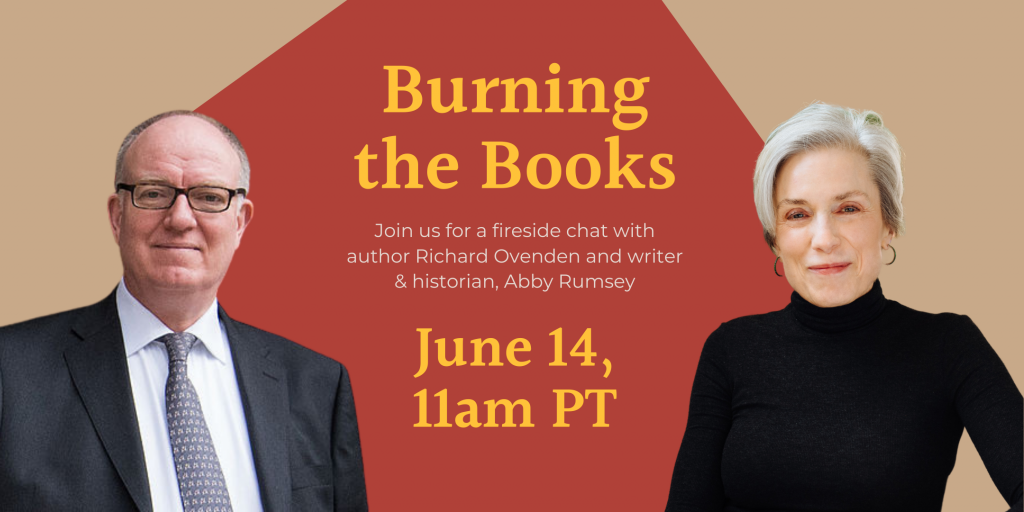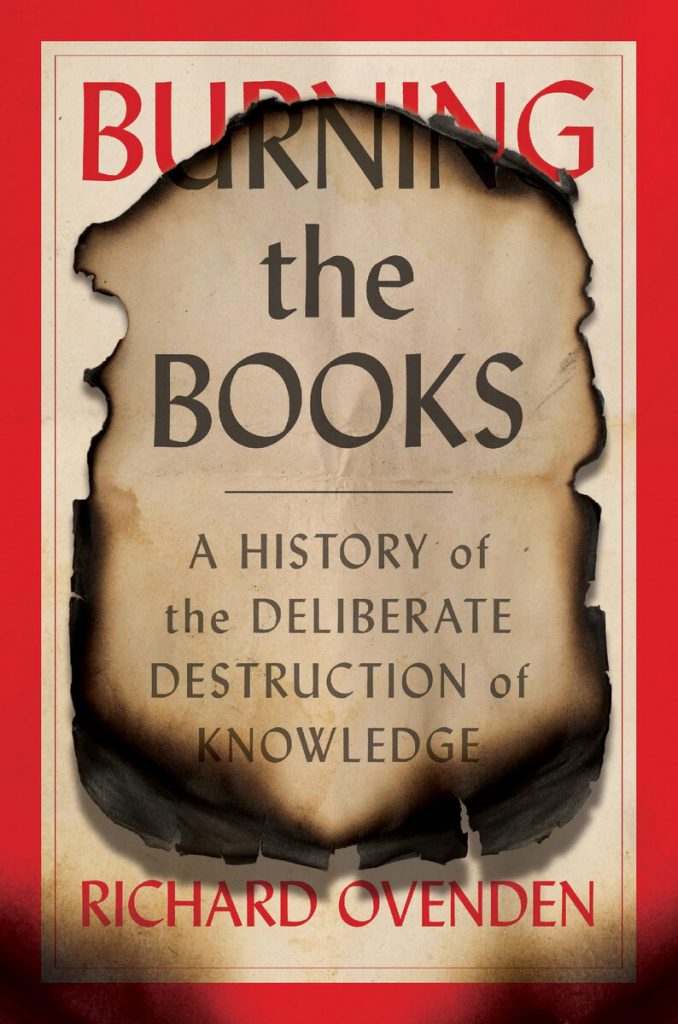
Please join us on June 14th at 11am PT for a virtual book talk with Richard Ovenden, about his book Burning the Books: A History of the Deliberate Destruction of Knowledge, which has been shortlisted for the Wolfson History Prize.
GET YOUR FREE TICKET HERE
Richard is joined by Abby Smith Rumsey, writer and historian, as they discuss the history of intentional recorded knowledge destruction. The conversation will be followed by a Q&A.
Buy a copy of Burning the Books through our local San Francisco bookstore, The Booksmith.
Richard Ovenden is Bodley’s Librarian at the University of Oxford, the senior executive officer of the Bodleian Libraries, a position he has held since 2014. His previous positions include Deputy Head of Rare Books at the National Library of Scotland, the Head of Special Collections and Director of Collections at the University of Edinburgh, and he held the Keepership of Special Collections at the Bodleian from 2003 to 2011, when he was made Deputy Librarian. He has been active in both the worlds of rare books and the history of photography, serving as Chairman of the Rare Books and Special Collections Group of CILIP, and Secretary of the Scottish Society for the History of Photography. He is currently a Trustee of the Kraszna Kraus Foundation, and of Chawton House Library. He is the author of John Thomson (1837–1921): Photographer (1997) and co-editor of A Radical’s Books: The Library Catalogue of Samuel Jeake of Rye (1999) and has contributed essays to the Cambridge History of Libraries, The Edinburgh History of the Book in Scotland, and the History of Oxford University Press.
Abby Smith Rumsey is a writer and historian focusing on the creation, preservation, and use of the cultural record in all media. She writes and lectures widely on analog and digital preservation, online scholarship, the nature of evidence, the changing roles of libraries and archives, and the impact of new information technologies on perceptions of history, time, and identity. She is the author of When We Are No More: How Digital Memory is Shaping our Future (2016). Rumsey served as director of the Scholarly Communication Institute at the University of Virginia and has advised universities and their research libraries on strategies to integrate digital information resources into existing collections and services. For over a decade, Rumsey worked with the Library of Congress’s National Digital Information Infrastructure and Preservation Program (NDIIPP) in the development of a national strategy to identify, collect, and preserve digital content of long-term value.
REVIEWS:
“A call to arms to protect and preserve knowledge. A fine and moving book which ranges widely across time and acts as a reminder of the importance of libraries to our culture.” — Wolfson History Prize judges
“Essential reading for anyone concerned with libraries and what Ovenden outlines as their role in ‘the support of democracy, the rule of law and open society.”―Wall Street Journal
“[Burning the Books] takes a nightmare that haunts many of us―the notion of the past erased―and confirms that it is no fiction but rather a recurring reality. In the process, Ovenden stays true to his calling, reminding us that libraries and librarians are the keepers of humankind’s memories: without them, we don’t know who we are.”―Jonathan Freedland, The Guardian
“Chronicles how libraries have served as sanctuaries for knowledge under constant threat, and what that means for the present and the future…Shows that when knowledge in print is threatened by power, it’s people pledged to the printed page, rather than armies, who step in…Made clear to me just how vulnerable libraries really are. When we don’t properly fund them, we risk lies becoming the truth, and the truth becoming a joke.”―Slate

It looks like a very good book, I have to introduce it to my friends
A great book will love to read and share –
Amazing Book, loved the synopsis of it.
Awesome book for knowledge seekers
Awesome book will really love to share it with my friends.
It looks like a very good book
A great book will love to read and share.
very good book…..
will love to read and share . . .
I love this so very lovely.. I make sure I tell my friends about it, they too need to read this.. thanks for sharing
It reminds me of “Fahrenheit 451” the novel by Ray Bradbury that is set in a society after the year 2010, where the task of firefighters is no longer to put out fires (the houses at that time are not flammable) but to burning books, since, according to his government, reading prevents being happy because it fills with anguish; By reading, men begin to think, analyze and question their life and the reality around them. The objective of the government is to prevent citizens from having access to books, as it ensures that citizens are happy, that they do not question their actions and perform in their work.
This is a nice book, it reminds of a novel I read back in the days, am not the only one that needs to see this, I will share this to my friends and family so they can also experience the wonders of this book.. thanks alot for sharing..